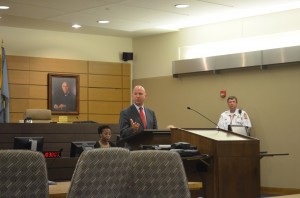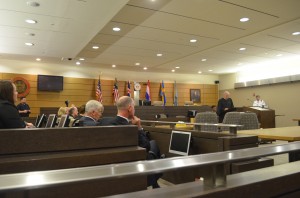Honors civil rights leader, Judge Leonard Williams
Wilmington, DE – Governor Markell announced today that the state will name the New Castle County Courthouse after the late Leonard Williams, the state’s second African-American judge. The building’s new signage will be unveiled next year.
“Judge Williams played a significant role in the civil rights movement in Delaware, from excelling as one of the first black students at the University of Delaware to fighting for justice in his partnership with Louis Redding and helping pave the way for future African-American attorneys and judges,” said Governor Markell. “With this naming, the state will fulfill commitments that call for using the New Castle County Courthouse to pay tribute to his achievements.”
In 1997, Wilmington City Council enacted an ordinance directing that land owned by the City at 4th and Walnut Streets include a deed restriction requiring any courthouse built there be named after Judge Williams. Mayor James H. Sills, Jr. imposed that deed restriction in 1998, and the property was sold later that year to the State to serve as the location of the New Castle County Courthouse. Since that time, language in the State’s Bond and Capital Improvements Act has vested discretion for the naming of the courthouse in the Director of the Office of Management and Budget or his or her predecessors.
Today’s announcement reflects the Governor’s belief that the state must honor the deed restrictions that existed when the state purchased the property.
After becoming the fifth African-American admitted to the Delaware bar in 1959, Williams was a longtime law partner of Louis L. Redding, Delaware’s first black lawyer who famously and successfully argued a case that became part of the U.S. Supreme Court’s Brown v. Board of Education decision outlawing segregation. Redding chose Williams to help him continue to pursue civil rights cases, including in the Supreme Court.
Williams would become an assistant city solicitor in Wilmington, and then chief prosecuting attorney for Municipal Court until 1966, when he was appointed to the bench. He served in that role for 32 years before Municipal Court was merged with the Court of Common Please, which currently resides in the New Castle County Courthouse that will bear Williams’ name.
Following his death in 2013 at age 78, the News Journal noted Williams’ commitment to organizations dedicated to justice and serving those in greatest need, including the NAACP, the National Welfare Rights Council, Layton Home, Peoples Settlement Association, and Walnut Street YMCA. In addition, he was “mentor-in-chief” at his former school, Howard High, where he worked with juniors and seniors interested in the legal profession.
###

